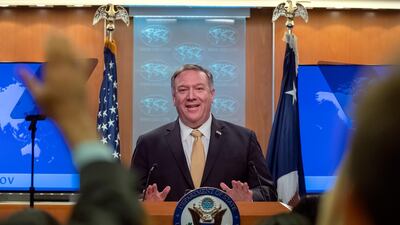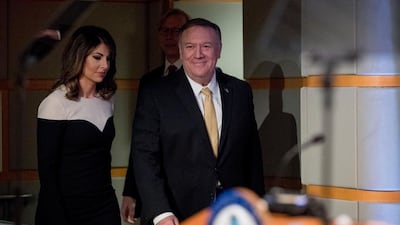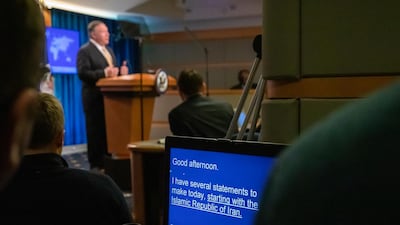US Secretary of State Mike Pompeo declared on Monday that Israeli settlements on occupied Palestinian lands were not illegal – a major shift of American policy.
“The establishment of Israeli civilian settlements in the West Bank is not, per se, inconsistent with international law,” Mr Pompeo said at the State Department.
The shift is based on “legal analysis and review”, he said.
It effectively repudiates a 1978 State Department legal opinion that says civilian settlements in the Occupied Territories are inconsistent with international law.
“Calling the establishment of civilian settlements inconsistent with international law has not advanced the cause of peace,” Mr Pompeo said.
“The hard truth is that there will never be a judicial resolution to the conflict, and arguments about who is right and who is wrong as a matter of international law will not bring peace.”
But he said that this should not be perceived as a statement on the final status of the West Bank, which is “for the Israelis and the Palestinians to negotiate”.
The international community overwhelmingly considers the settlements illegal. This is based in part on the Fourth Geneva Convention, which bars an occupying power from transferring parts of its own civilian population to occupied territory.
UN Resolutions 242 and 338 also call for Israeli withdrawal from land it grabbed during 1967 and 1973 wars, which includes the West Bank.
But the Trump administration has dismissed these international frameworks, recognising the Syrian-occupied Golan Heights as Israeli territory last March, and moving the US embassy to Jerusalem in December 2017.
The Palestinian authority was quick to decry Monday’s decision.
Lead negotiator Saeb Erekat said the Trump administration showed it was a threat to the international system and that the US was trying to replace international law with the “law of the jungle”.
Mr Netanyahu welcomed the move and used it to attack his political rival, Blue and White Party leader Benny Gantz.
“Amazing. While the United States recognises our rights in Israel, Benny Gantz is trying to form a minority government with those who do not recognise any of our rights in our country,” he tweeted.
Mr Pompeo said the announcement had not been timed to help Mr Trump’s ally, Mr Netanyahu, in forming a government.
Ayman Safadi, Jordan’s Minister of Foreign Affairs, took to Twitter on Monday to condemn America’s move.
"Settlements in occupied #Palestine are a blatant violation of Int'l law & UNSCRs," he said.
“They are an illegal action that’ll kill 2-state solution. Jordan’s position in condemning them is unwavering. We warn against dangerous consequences of US change of position on settlements on MEPP.”
Israel’s Kann TV reported that the decision was made in co-ordination with Israel’s National Security Council and the Attorney General and his staff.
The EU issued a statement condemning the US move.
“Our position hasn’t changed. All settlement activity is illegal under international law and it erodes the viability of the two-state solution and the prospects for a lasting peace,” it said.
In the US, evangelical Christian leader Mike Evans, the founder of Jerusalem’s Friends of Zion Museum, welcomed the move, but policy experts were puzzled by its timing and value.
“Whatever merit there may be to this, it is crazy to announce a shift on US policy on Israeli settlements in the West Bank precisely when millions across the Middle East are protesting the corrupt misrule of Iran and its local proxies,” tweeted Rob Satloff, of the Washington Institute for Near East Policy.
The Trump administration’s decision on moving the US embassy to Jerusalem was also announced during protests in Iran, in December 2017.
Israel captured the West Bank and East Jerusalem in the 1967 Arab-Israeli war and quickly began settling the newly conquered territory.
Today, about 700,000 Israeli settlers live in the two areas, both of which are claimed by the Palestinians for their future state.






